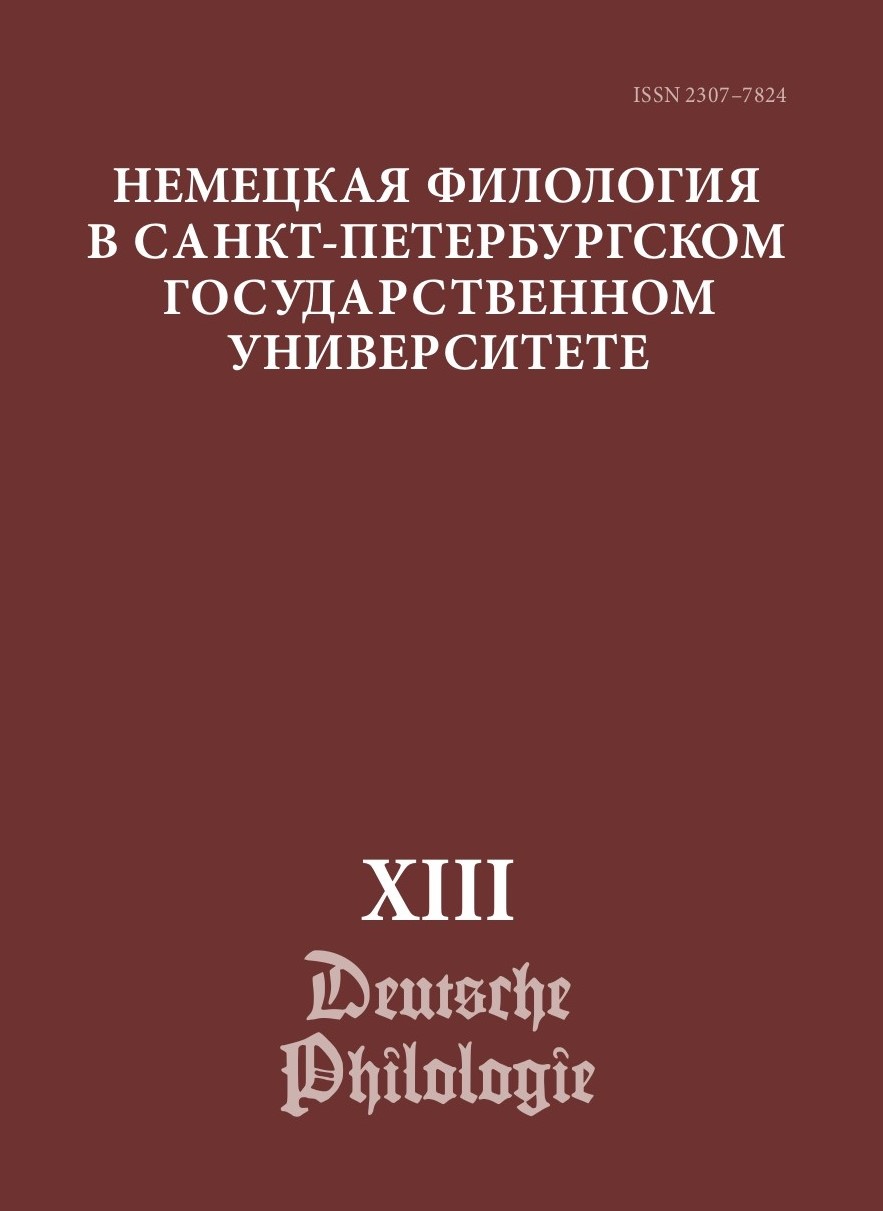POLITENESS AS A WAY TO ENCOURAGE CONVERSATION
DOI:
https://doi.org/10.21638/spbu33.2023.112Abstract
The empirical material is the novel of the German-speaking writer B. Schirmer Schlehweins Giraffe. The research focuses on speech strategies and tactics of politeness as one of the components of verbal communication addressed to the Giraffe. Recorded in a text, the model of verbal and non-verbal behavior of a person, the author, trying to encourage a conversation with an animal is analysed. The category of politeness, thus, appears in a single discursive space with the direction. The relevance of the study is explained by the communicative and pragmatic approach applied to the analysis of speech addressed to an animal. The narrator treats the animal with great care. He also asks various questions to the Giraffe as he believes the Giraffe is able to communicate. However, the author fails to establish communication. The Giraffe is silent. The narrator uses directive linguistic means in the colloquial style of speech: brief questions, accentual particles, lexical and syntactic repetitions, appeals to the Giraffe and so on. The author-narrator repeatedly corrects his verbal behavior, uses various strategies, but, eventually, comes to the conclusion, that the Giraffe is incoherent. Finding herself in a usual natural environment, the Giraffe unexpectedly reproduces a phrase which belongs to the group of precedent texts, to the surprise of the narrator. The narrator understands the reasons for the Giraffe’s persistent silence. The communicative strategy of the author-narrator changes, his speech becomes rude and impolite. Thus, the language material illustrates the widest spectrum of politeness pragmatics and deviations from this speech strategy.
Keywords:
modality of politeness, implicit and explicit politeness, directivity, literary narrative, verbal communication with an animal
Downloads
References
References
Baikulova A. N. Speech Communication in Family Circle: the Role of Animals, Plants and Material Objects. Izvestiya of Saratov University. Vol. 8. Philology. Journalism. Iss. 2. 2008, pp. 14–20. (In Russian)
Burlak S. The origin of language: Facts, research, hypotheses. Мoscow: Astrel’: CORPUS Publ., 2011. 464 p.
Ermolova O. B. Linguistic Features of Human-to-Pet Communication. Perm University Herald. Iss. 4 (32), 2015, pp. 58–66. (In Russian)
Еrzinkjan I. L. Linguistic category of politeness: semantics and pragmatics. Еrevan. ЕGU Publ., 2018. 410 р. (In Russian)
Formanovskaya N. I. Speech interaction: communication and pragmatics. Мoscow: Ikar Publ., 2007. 480 p. (In Russian)
Grice P. Logic and Conversation. Syntax and Semantics, 3: Speech Acts. New York: Academic Press, 1975, pp. 41–58.
Helbig G., Buscha J. Deutsche Grammatik. Ein Handbuch für den Ausländerunterricht. Berlin, München, Wien, Zürich, New York, 2001. 735 S. (In German)
Krylova T. V. Naive-linguistic notions of politeness and the vocabulary serving them. Language picture of the world and system lexicography. Мoscow: Iazyki slavianskikh kul’tur Publ., 2006, pp. 241–400. (In Russian)
Myatsinskaya E. I. The second person in the history of the English language and linguoculture. Iazyk kak kul’turnyi kod natsii. St. Petersburg, St. Petersburg University Press, 2014, pp. 159–175. (In Russian)
Nefedov S. Т. Theoretical grammar of the German language. Syntax. Text: handbook. St. Petersburg: St. Petersburg University Press, 2022. 374 p. (In Russian)
Novozhilova X. R. Source of Information in Narrative Disсourse (Based On German Belles-Lettres Works). German Philology in St. Petersburg State University. X. Continuity and Dynamics of the Grammar Studies: Commemorating 110 Yearssince the Birth of V. G. Admoni. Collection of Research papers. St. Petersburg, St. Petersburg University Press, 2021, pp. 205–217. (In Russian)
Oster U. Using corpus methodology for semantic and pragmatic analyses: What can corpora tell about the linguistic expression of emotions? Cognitive Linguistics, 2010, no. 21 (4), pp. 727–763.
Slyshkin G. G. From text to symbol: linguistic and cultural concepts of precedent texts in consciousness and discourse. Moscow, Academia Publ., 2000, 125 p.(In Russian)
Downloads
Published
How to Cite
Issue
Section
License
Условия передачи авторских прав на статьи и рецензии, опубликованные в ежегодном периодическом издании «Немецкая филология» регулируются условиями Лицензионного Договора автора с Санкт-Петербургским государственным университетом. В соответствии с Лицензионным Договором опубликованные материалы находятся в открытом доступе, а авторам бесплатно предоставляется неограниченные возможности их распространения и самостоятельного архивирования.




